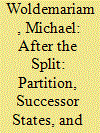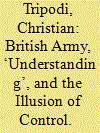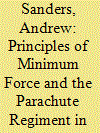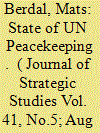| Srl | Item |
| 1 |
ID:
160028


|
|
|
|
|
| Summary/Abstract |
Why do partitioned successor states engage one another in armed conflict? We explore the drivers of war between successor states by comparing two border crises that followed the partitions of Ethiopia (1993) and Sudan (2011). We argue that the politico-military struggles that give way to partition create important historical memories that shape what successor states think about the utility of military force. While the partition of Ethiopia yielded successor states led by regimes that were victors of the preceding war of partition, the war of partition in Sudan produced successor states that emerged out of military stalemate. This distinction explains why Ethiopia and Eritrea waged a costly border war that Sudan and South Sudan were able to avoid.
|
|
|
|
|
|
|
|
|
|
|
|
|
|
|
|
| 2 |
ID:
160026


|
|
|
|
|
| Summary/Abstract |
Over the past decade, Western military doctrines concerned with matters of irregular warfare and counterinsurgency have emphasised the requirement for properly ‘understanding’ the social, political and cultural environments in which those militaries may operate; the so-called human and socio-political ‘terrain’. This has led to a number of advancements and initiatives designed to facilitate the way that militaries may enhance that understanding. One of those initiatives has been the emergence from within the British military of a doctrine – JDP 04 ‘Understanding’ – designed for that purpose. Using that doctrine and other subsequent publications as a template, this article will examine the utility of ‘understanding’ for those commanders seeking to match military activities with political ends. It proposes that while any advances in understanding the operating environment are to be applauded, the ‘understanding’ of greatest importance is that relating to the feasibility of the strategic objectives at hand. If those objectives lack inherent feasibility, then the development of subordinate forms of understanding, particularly in relation to the socio-political dynamics of target societies, will likely only serve to slow the process of failure.
|
|
|
|
|
|
|
|
|
|
|
|
|
|
|
|
| 3 |
ID:
160027


|
|
|
|
|
| Summary/Abstract |
Developing literature on Operation Banner, the codename for the British military operation in Northern Ireland, has indicated that the conduct of soldiers deployed was not always in line with principles of minimum force. Adherence to these principles would seem to have been essential to the success of the operation given the initial deployment of the soldiers was in the role of military aid to the civil power. This article will examine the role of one of the British Army’s most aggressive units, the Parachute Regiment, and will show how the responses of the regiment to the demands of the operation in Northern Ireland were frequently in contravention of minimum force principles.
|
|
|
|
|
|
|
|
|
|
|
|
|
|
|
|
| 4 |
ID:
160030


|
|
|
|
|
| Summary/Abstract |
What explains the variation in states’ nonstate partners in civil warfare? States often use nonstate actors to do what their regular military forces cannot do well – navigate the local population. Some of their nonstate partners are ordinary civilians, while others are battle-hardened fighters with a rebellious or criminal past. The choice of proxy carries serious implications for the patterns and effects of violence during civil war, human rights, and international security. This article is the first to disaggregate the nonstate counterinsurgents and offer an explanation for why and how states use each type. It brings together the politics of collaboration with the politics of exploitation. The article shows that the state’s use of nonstate proxies is shaped by the supply of willing collaborators, the state’s ability to exercise control over them, and the trade-offs underlying the use of the different types of nonstate actors. The empirical evidence used to support this argument comes from a novel, comparative study of Turkey’s counterinsurgency campaign against Kurdish separatists and India’s counterinsurgency against Kashmiri separatists. The original data were collected through fieldwork in the disputed territories of each country.
|
|
|
|
|
|
|
|
|
|
|
|
|
|
|
|
| 5 |
ID:
160029


|
|
|
|
|
| Summary/Abstract |
The article considers the state of UN peacekeeping through the prism of its long-running operation in the Democratic Republic of the Congo (DRC). Focusing in particular on the challenges raised by use of force and the protection of civilians in conditions of ongoing armed conflict, it argues that UN field operations must be aligned much more closely than they have been over the past 15 years to political and diplomatic efforts aimed at securing viable political settlements to internal conflict. The issues raised by the history of the UN’s troubled mission in the DRC are deeply relevant to the wider discussion of the organisation’s role in the field of peace and security.
|
|
|
|
|
|
|
|
|
|
|
|
|
|
|
|